|
De Oostenrijkse schrijver Ferdinand Kürnberger werd op 3 juli 1821 in Wenen geboren. Zie ook mijn blog van 3 juli 2007 en ook mijn blog van 3 juli 2009 en ook mijn blog van 3 juli 2010
xml:namespace prefix = o ns = "urn:schemas-microsoft-com:office:office" />
Uit: Der Dichter des »Don Juan«
Auf dem Gracht zu Amsterdam stand noch vor wenigen Jahren ein kleines, baufälliges Häuschen, das Eigentum einer alten Höckerin, welche mit Heringen handelte. Die Höckerin war die Witwe eines Ewerführers, welcher eines Tages das Unglück hatte, mit einer unvorsichtigen Wendung seines Kopfes unter ein von Pferden gezogenes Schiffsseil zu geraten, bei welcher Gelegenheit das Seil ihm den Kopf vom Rumpfe riß. Der Ewerführer aber war der Sohn eines Schneiders und der Majoratserbe des besagten baufälligen Häuschens.
Das Häuschen hatte nur drei schmale Fensterchen Front und zwei sogenannte Gestöcke, welche aber so niedrig waren, daß sie beide zusammen nicht die Höhe der Beletage des nebenstehenden Kaufmannhauses erreichten. Es war ein »Fachbau«, d. h. die gemauerten Wände mit Balken durchschossen, deren Lagen und Widerlagen, gleichlaufende Linien und schiefe Einsätze allerlei geometrische Figuren bildeten oder vielmehr gebildet hatten, denn diese schönen Zeiten waren längst dahin. Die Balken hatten sich »geschwungen« und ihre ursprünglichen Lagen mehr oder minder verändert, wodurch das darauf und dazwischen liegende Mauerwerk genötigt worden, mit Hilfe verschiedener Risse sich gleichfalls in allerlei neue Fugen zu bequemen. Die Fensterchen der beiden Geschosse standen, wie chinesische Augen, schief gegeneinander, das Mauerwerk zwischen ihnen hatte sich, wie eine geschwollene Backe, sanft nach auswärts gebogen und das Dach war eingesunken. Am traurigsten aber sah das Erdgeschoß aus. Hier hatte zu dem Alter des Hauses die aus dem Boden aufdringende Feuchtigkeit noch mitgewirkt und das Erdgeschoß war kurzweg verschwunden. Es war hinweggefault. Ein sinnverwirrendes Chaos von Balken und Sparren hatte man nach und nach als Stützen untergeschoben und die Stützen wieder gestützt und mitten in diesem Flickwerk saß die Höckerin mit ihren Heringen.
Ich weiß nicht, ob dieses malerische Trümmerwerk mitten in einer großstädtischen Straße die Zärtlichkeit der Künstler gewonnen und irgendwo als hochbezahltes Kabinettstück den unsterblichen Trödel der Holländer vermehren hilft. Das aber weiß ich, daß viele Reisende vor der Ruine stehen blieben und sie mit bewundernden Blicken anstaunten.
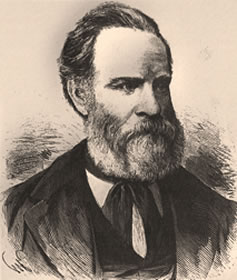
Ferdinand Kürnberger (3 juli 1821 14 oktober 1879)
Onafhankelijk van geboortedata:
De Amerikaanse schrijver David Benioff (pseudoniem van David Friedman) werd geboren in New York City in 1970. Hij veranderde zijn naam naar Benioff, naar zijn moeder, die een Russische-Joodse immigrant was. Benioff studeerde aan het Darthmouth College en werkte als een uitsmijter bij clubs. Op de leeftijd van 22 jaar werd Benioff leraar Engels aan het Poly Prep in Brooklyn, New York City. Daarnaast studeerde hij ook aan de University of California Irvine, waar hij een Master of Fine Art behaalde bij het creatief schrijven-programma. Terwijl Benioff werkte als leerkracht Engels schreef hij een boek getiteld The 25th Hour, dat positief werd ontvangen. Later adapteerde hij het boek voor de film, met in de hoofdrol Edward Norton en geregisseerd door Spike Lee. Daarnaast heeft hij ook een collectie kortverhalen geschreven genaamd When the Nines Roll Over (And Other Stories) (2004).
Benioff schreef onder andere screenplays voor Troy (2004), Stay (2005) en The Kite Runner (2007). Ook schreef hij het script voor de X-Men spinn-off X-Men Origins: Wolverine, dat in 2010 in de zalen verscheen. In 2008 werd zijn tweede boek, City of Thieves, A Novel gepubliceerd.
Uit: City of Thieves
My grandfather, the knife fighter, killed two Germans before he was eighteen. I don't remember anyone telling meit was something I always seemed to know, the way I knew the Yankees wore pinstripes for home games and gray for the road. But I wasn't born with the knowledge. Who told me? Not my father, who never shared secrets, or my mother, who shied away from mentioning the unpleasant, all things bloody, cancerous, or deformed. Not my grandmother, who knew every folktale from the old countrymost of them gruesome; children devoured by wolves and beheaded by witchesbut never spoke about the war in my hearing. And certainly not my grandfather himself, the smiling watchman of my earliest memories, the quiet, black-eyed, slender man who held my hand as we crossed the avenues, who sat on a park bench reading his Russian newspaper while I chased pigeons and harassed sugar ants with broken twigs.
I grew up two blocks from my grandparents and saw them nearly every day. They had their own small insurance company, working out of their railroad apartment in Bay Ridge, catering primarily to other Russian immigrants. My grandmother was always on the phone, selling. No one could resist her. She charmed them or she frightened them, and either way, they bought. My grandfather manned the desk, doing all the paperwork. When I was small, I would sit on his lap, staring at the stump of his left index finger, rounded and smooth, the top two knuckles so cleanly severed it seemed he'd been born without them. If it was summer and the Yankees were playing, a radio (after his seventieth birthday, a color television my dad bought him) broadcast the game. He never lost his accent, he never voted in an election or listened to American music, but he became a devout Yankees fan.
In the late nineties, an insurance conglomerate made an offer for my grandparents' company. It was, according to everyone, a fair offer, so my grandmother asked them to double it. There must have been a good deal of haggling, but I could have told the conglomerate that haggling with my grandmother was a waste of time. In the end they gave her what she wanted and my grandparents, following tradition, sold their apartment and moved to Florida.
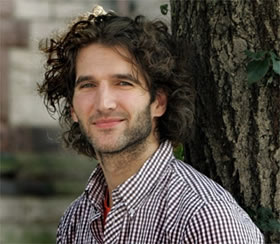
David Benioff (New York, 1970)
De Spaanse schrijver Ramón Gómez de la Serna werd geboren op 3 juli 1888 in Madrid. Zie ook mijn blog van 3 juli 2009 en ook mijn blog van 3 juli 2010
Some Greguerias:
Rain is melancholy because it takes us back to the time when we were fishes.
A thunderstorm is the first day at school all over again.
Electricity is God's nervous system.
The rainbow is a dry-cleaner's neon advert.
Some men with wooden legs turn green in spring and rebecome satyrs.
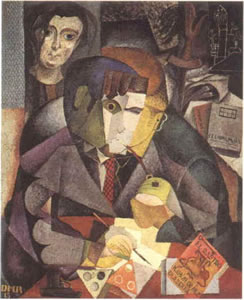
Ramón Gómez de la Serna (3 juli 1888 13 januari 1963)
Portret door Diego Rivera, 1915
De Franse dichter, schrijver en criticus Francis Carco werd geboren op 3 juli 1886 in Nouméa, Nieuw Caledonië. Zie ook mijn blog van 3 juli 2009 en ook mijn blog van 3 juli 2010
Il pleut
Il pleut cest merveilleux. Je taime.
Nous resterons à la maison :
Rien ne nous plaît plus que nous-mêmes
Par ce temps darrière-saison.
Il pleut. Les taxis vont et viennent.
On voit rouler les autobus
Et les remorqueurs sur la Seine
Font un bruit... quon ne sentend plus !
Cest merveilleux : il pleut. Jécoute
La pluie dont le crépitement
Heurte la vitre goutte à goutte...
Et tu me souris tendrement.
Je taime. Oh ! ce bruit deau qui pleure,
Qui sanglote comme un adieu.
Tu vas me quitter tout à lheure :
On dirait quil pleut dans tes yeux.
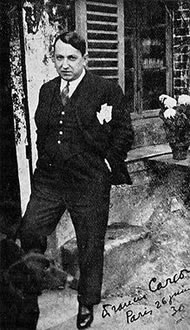
Francis Carco (3 juli 1886 26 mei 1958)
In 1930
De Engelse dichter en schrijver Edward Young werd geboren op 3 juli 1683 in Upham, Hampshire. Zie ook mijn blog van 3 juli 2007 en ook mijn blog van 3 juli 2008 en ook mijn blog van 3 juli 2009 en ook mijn blog van 3 juli 2010
The Complaint: or Night Thoughts (fragment)
Silence and darkness: solemn sisters! twins
From ancient Night, who nurse the tender thought
To reason, and on reason build resolve
(That column of true majesty in man),
Assist me: I will thank you in the grave;
The grave, your kingdom: there this frame shall fall
A victim sacred to your dreary shrine.
But what are ye?--
Thou, who didst put to flight
Primeval Silence, when the morning stars,
Exulting, shouted o'er the rising ball;
O Thou, whose word from solid darkness struck
That spark, the sun; strike wisdom from my soul;
My soul, which flies to thee, her trust, her treasure,
As misers to their gold, while others rest.
Through this opaque of nature, and of soul,
This double night, transmit one pitying ray,
To lighten, and to cheer. O lead my mind,
(A mind that fain would wander from its woe),
Lead it through various scenes of life and death;
And from each scene the noblest truths inspire.
Nor less inspire my conduct, than my song;
Teach my best reason, reason; my best will
Teach rectitude; and fix my firm resolve
Wisdom to wed, and pay her long arrear:
Nor let the phial of thy vengeance, pour'd
On this devoted head, be pour'd in vain.
The bell strikes one. We take no note of time
But from its loss. To give it then a tongue
Is wise in man. As if an angel spoke,
I feel the solemn sound. If heard aright,
It is the knell of my departed hours:
Where are they? With the years beyond the flood.
It is the signal that demands despatch:
How much is to be done? My hopes and fears
Start up alarm'd, and o'er life's narrow verge
Look down--on what? a fathomless abyss;
A dread eternity! how surely mine!
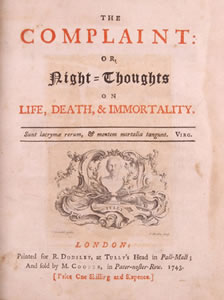
Edward Young (3 juli 1683 5 april 1765)
De eerste druk van Night Thoughts uit 1743, Londen
|



